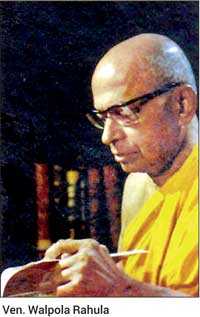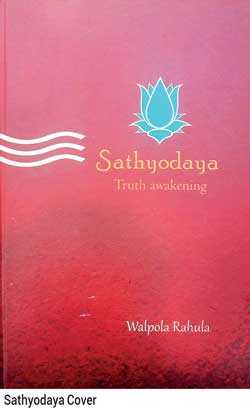Friday Feb 27, 2026
Friday Feb 27, 2026
Monday, 1 April 2019 00:29 - - {{hitsCtrl.values.hits}}
Two events bearing on each other
Two events that had no direct connection to each other but could have a bearing took place in Sri Lanka last week. One was the AFP report about an unconventional method used by the country’s power producer, Ceylon Electricity Board or CEB, to solve the ongoing power crisis in the country. The other was the release of the English translation of Ven. Walpola Rahula’s 1932 book, Sathyodaya, in Colombo.
CEB’s plead for mercy of rain gods
According to AFP report, after failing to stimulate rains via seeding the clouds, CEB is said to have resorted to invoking the mercy of ‘Rain Gods’ to deliver rains to catchment areas. If Gods had answered its call, it could have produced at most a quarter of the power needed by the country through hydropower generation.
The strategy adopted by CEB to invoke God’s mercy has been simple. Take some precious scarce water from reservoirs feeding the power plants, take that supposed to be holy water in a motorcade to be seen by all to Anuradhapura and make an offering to the Sacred Sri Maha Bodhi in what was called ‘Pen Puja’ or Sacred Water-Offering Ritual.

This is an instance of human emotions and fears giving way to their rational side when faced with unsolvable problems. But, this is not the first time the Homo sapiens or Man the Wise had sought the assistance of supernatural powers to provide solutions to its mundane issues. They had done so on innumerable occasions in the past as documented by Oxford Historian Yuval Noah Harari in Sapiens: A Brief History of Humankind, published in 2011. The modus operandi has been to project them as virtuous people worthy of being supported by these divine powers.
But, Bhagawat Geeta, a sacred Hindu text, has warned those mortal humans seeking divine assistance. It has said that ‘God does not reward the virtuous nor does he punish the wicked’. What it means is that both rewards and punishments are in the human plane to be handled by humans and not by divine powers.
Animals don’t seek refuge of supernatural powers
The difference between animals and humans is that animals do not seek the support of divine powers to resolve their problems.
They have an inbuilt genetic code that would guide them in such instances. There were enough stories that when Asian tsunami hit the shores of Sri Lanka in 2004 that animals had fled to safe places before even humans could think so. Over the years of evolution, humans have deactivated that genetic code and as a result, have to place themselves at the mercy of supernatural powers when they are faced with mundane problems.
These emotional fears of humans, passed from generation to generation, have been deeply ingrained in their psyche making it easy to trigger fears compared to building confidence in them. It also has provided a golden opportunity for crafty people to exploit such fears in fellow humans for their own benefits.
For instance, the fourth century BCE Indian economics Guru, Kautilya, advised the king in his treatise on economics, The Arthashastra, that when the king’s treasury runs low and there is no way to build it up quickly, the king should send his agents, dressed as soothsayers, to countryside and spread the story that there have been some spots in the Sun portending malefic effects to people. Once the people have been sufficiently conditioned by fear, the king should send another team of agents offering the solution too.
That solution is to give them a talisman that would protect them from the malefic effects. The king, advised Kautilya, can produce this talisman and sell it at his own price thereby bringing additional revenue to royal coffers.
Do not seek the refuge of gods
This happened 200 years after the Buddha who had categorically warned people about the futility of going after such supernatural powers on the advice of others. In the Kaalaama Sutta, he advised the Kaalaamas that they should not go by what the elders say, or traditions or wisdom found in scriptures or what holy-men say, but believe in what they find as beneficial and reject not beneficial in general to all.
The current power crisis is not due to the wrath of divine powers visiting Sri Lanka. It has been a chronic issue because with economic growth, the demand for power increases at a faster rate than the growth in the economy. Since the demand outpaces supply, a day would come when the country’s installed power capacity is insufficient to meet the demand.
In Dhajagga Sutta he advised the Bhikkus that they should not seek the refuge of God Sakra or any other god when they are inflicted with fear. Instead, they should seek refuge of the Buddha who has attained the three wholesome states of mind, alobha (non-greed), adosha (non-hatred) and amoha (non-delusion). So, the way out for mortal humans is to cultivate these mental states in themselves. It would protect them from personal as well as societal disasters.
It seems that the Buddha’s message has not been accepted widely even by contemporary Indians since Kautilya could exploit these fears of fellow citizens after 200 years. This message has not gone to even fellow Sri Lankans who had followed the Buddha’s way for more than 2,000 years. Therefore, from time to time, erudite Buddhist scholars had attempted at imparting Buddha’s wisdom to fellow Sri Lankans.

One such scholar was Ven. Walpola Rahula who had written a series of articles providing proper advice to Buddhists as to the correct practice of Buddhism as far back as 1932. These articles were later published in a booklet form titled Sathyodaya for the benefit of the contemporary Buddhists and could be accessed from the digital repository of the University of Sri Jayewardenepura at http://dr.lib.sjp.ac.lk/handle/123456789/1791. This book has now been translated into English by Niranjan Selvadurai under the title ‘Truth Awakening’ and published by Walpola Rahula Foundation Trust in Sri Lanka. Truth Awakening was launched at a function in Colombo last week.
Human failure cannot be corrected through divine intervention
Had the top political leaders in Sri Lanka and CEB officials read Walpola Rahula’s Sathyodaya, they would not have resorted to invoking divine powers to solve the country’s chronic as well as acute power crisis. Their solution is totally irrelevant like the example given by the erudite Buddhist monk, Dharmasena Thero, in Saddarmaratnavaliya written during the Kotte Era of Sri Lanka’s history. The erudite Thero equated when somebody does something irrelevant to ‘applying medicine to the back when filarial swelling is in the foot’.
The current power crisis is not due to the wrath of divine powers visiting Sri Lanka. It has been a chronic issue because with economic growth, the demand for power increases at a faster rate than the growth in the economy. Since the demand outpaces supply, a day would come when the country’s installed power capacity is insufficient to meet the demand. The country’s top leadership was warned about this by the Central Bank as far back as 2001 in a special Box Article titled ‘Power Crisis’ in its Annual Report for 2001 (pp 109-11). The recommendation of the Central Bank to power authorities in the country was to expand the installed capacity through a combination of alternatives as an urgent measure. This was not heeded to.
Then, the energy experts warned the power authorities in 2015 that unless the installed capacity is increased as quickly as possible, the country would face a severe energy crisis by end 2018. Thus, it is not due to divine wrath but due to human failure that the country has now been engulfed with a power crisis. Instead of taking proper measures even at this late stage, it is uncalled for that CEB has resorted to primitive measures to provide a solution to the problem.
Presenting Buddhist thoughts in the form of a dialogue
Walpola Rahula’s Sathyodaya is in the form of questions and answers similar to the tradition used by Plato in his writings. The questions which bother laymen are posed to Walpola Rahula who then goes on answering them. These questions have basically been what the laymen had had in 1930s. But when one observes how Sri Lankans behave today – CEB officials are just one such instance – they are relevant to today as well as the future. Though they are basically about the bizarre Un-Buddhist practices of Sri Lanka’s lay Buddhists and Bhikkus, people believing in other faiths too could gain enlightened wisdom through them. Therefore, Walpola Rahula’s Sathyodaya is for all and not necessarily for the Buddhists.
Seven important chapters
His views have been presented in seven chapters in the booklet. They cover various subjects like making proper offering to the Buddha, fallacy of calling Gods to listen to Dhamma sermons, violation of the spirit of the Buddha by adopting the caste system in the Sasana, and importance of free inquiry to attain wisdom and enlightenment.
Making Pujas in the proper way
The first one relates to how the Buddhists should make proper offerings to the Buddha. While admitting that he is a strong advocate of offering Pujas to the Buddha, he takes issue with how they are presently performed by lay Buddhists as well as Bhikkus.
Says Rahula: ‘Many Buddhists today do not conduct Buddha Puja in an appropriate manner. Various distasteful activities are currently staged under the noble banner Buddha Puja. They include performing acrobatics in temple premises, conducting processions with comical entertainments thrown in, and placing food in front of statues. These are not offerings befitting the Buddha’.
Had the top political leaders in Sri Lanka and CEB officials read Walpola Rahula’s Sathyodaya, they would not have resorted to invoking divine powers to solve the country’s chronic as well as acute power crisis. Their solution is totally irrelevant like the example given by the erudite Buddhist monk, Dharmasena Thero, in Saddarma-ratnavaliya written during the Kotte Era of Sri Lanka’s history. The erudite Thero equated when somebody does something irrelevant to ‘applying medicine to the back when filarial swelling is in the foot’.
Rahula says that there is nothing wrong in offering foods to the living Buddha since he depends on foods for living. But offering foods and drinks to a dead person is a ritual practiced by those who believe in dead spirits and it is not proper to place the Buddha in the same category as a dead spirit. Besides, when it is done in the name of the Buddha on a massive scale, it is a waste of foods and water which can be used to feed the poor and the hungry.

Further, when foods and water are offered to a statue seeking merit, it is like undertaking a commercial transaction in which one invests his money for profits later. Thus, when CEB offers water from reservoirs to Sri Maha Bodhi – a representation of the Buddha, it is like bribing the Buddha to get rains from him.
It in fact precludes the person, according to Rahula, from extending universal kindness and empathy to fellow citizens thereby moving him away from the goal of attaining enlightenment. Rahula maintains that once a Master dies, his disciples convert what he had preached to a religion which is then used by them to maintain livelihood making false promises to devotees. But the way to honour the Buddha is not to offer foods and water to his representation, but to follow the Buddha’s path.
Don’t plead for support from gods who are inferior to humans
According to Rahula, a true Buddhist cannot expect a God to help him because they are inferior to humans and an inferior person cannot grant a boon to a superior. The Buddha was very emphatic that Gods need help from humans and not the other way about. Even a God cannot attain Buddhahood unless he is born as a human on this earth.
In the same way, the belief that Sri Lanka has been handed to various Gods for protection of the country as well as Buddhism is a misconception. Buddhism signifies identifying wholesome activities from unwholesome ones and cleansing the minds of all defilements by following a life represented by ethical conduct or Seela, mental discipline or Samadhi and wisdom or Pragna.
They are to be cultivated by humans and Gods cannot either inculcate them in humans or protect these virtuous acts from being abused. Rahula questions when Gods cannot protect even the shrines dedicated to them from harm, how they could protect Buddhism whose virtuous practices are intangible and invisible.
Organising Sasana on caste lines when the Buddha has admonished it
In Sathyodaya, he has questioned the validity of segregating the Buddha sasana on caste lines when the Buddha has very clearly admonished the practice. The Buddha had very firmly stood against discriminating persons on the basis of caste or ethnicity. For him, all are human beings or in terms of modern science, Sapiens, share a common genetic code. But the Buddha sasana, claimed to be safeguarded by Gods, is organised on caste lines.
Says Rahula: ‘The chief monks of the Siam sect proudly proclaim themselves as the custodians of Buddhist teaching. However, continuing with a tradition which goes against the foundation of the Buddha’s teaching has contributed to the collapsing of the imaginary castle representing the sasana. It pains me that so called protectors of the teaching are in fact destroying it’. Though in 1932 Rahula expected that the caste system would be done away with in the Buddha sasana as well as in lay Sri Lankan society in the future, today, it is very much pertinent in the sasana than in lay communities.
Wishes cannot be passed onto others
Rahula’s bold attempt at promoting free inquiry in the Buddha sasana as well as among lay people is the best portion which this booklet carries. He has said that one should not be afraid of questioning Buddhism as well as its numerous practices. Instead of following blindly what the Bhikkus are saying, one should cultivate the spirit of free inquiry for one’s own benefit as well as for the benefit of the whole society.
Many wish their relatives or friends to attain Nirvana after they have died. Rahula says a wish of one person cannot be passed on to another however much the wisher leads a virtuous life. If anybody wants to attain Nibbana, he should practice, while he is living, the virtuous principles which the Buddha has pronounced. If it has not been done while the person was living, his relatives or friends cannot just make a wish and lead him to attain Nibbana.
A must read by all
Sathyodaya has been translated into English and published as a booklet at a time when Sri Lanka’s various communities are fighting with each other citing language, religion or ethnicity. This is a man-made division of human beings done without reference to the true nature of Homo sapiens. Rahula had aspired for a society free from bias, prejudice and hatred. He addressed the Sinhala readers earlier through Sathyodaya. Now, even the English speaking elite is being addressed through its English translation. It is a must read by all irrespective of their social status, religious practices or ethnicity.
(W.A. Wijewardena, a former Deputy Governor of the Central Bank of Sri Lanka, can be reached at [email protected].)